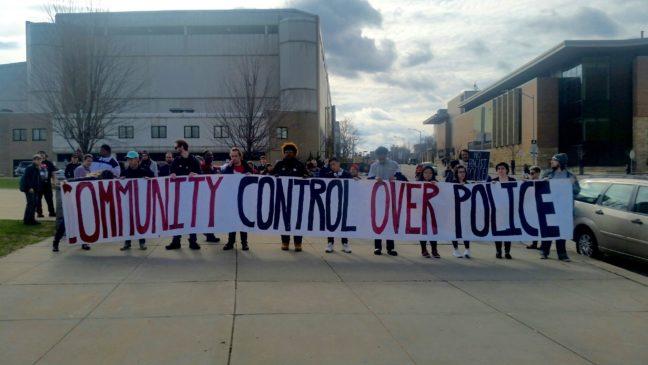Last week I marched alongside thousands down State Street, bellowing chants with signs hoisted in the air. We marched to end gun violence — an epidemic that destroys hundreds of lives each year before reappearing the next year. As we marched, I was overcome with a few emotions.
First, I felt the empowerment of children and the platform they had built. The majority of speakers were teens calling to unequivocally avoid experiencing the terror of gun violence.
But more striking was the ethnic makeup of the protest — white. As I scanned, I saw people that looked like me rallying around a cause that white teens have dominated.
In one of the speeches, a high schooler from the Madison area acknowledged this disparity and laid out a platform that was more inclusive of people of color — get police out of schools, for they are causes of gun violence too. The second this was spoken, much of the crowd dispersed. I’m not sure if they were tired, as it was drawing to the end of the protest, but their actions indicated a lack of caring and empathy.
Evaluating investigations of deadly police shootings two years after Robinson
Police violence is gun violence. There’s no question about it.
Police murder people of color every day for nothing other than their skin tone. The amount of grotesque racism that has seeped into policing is abhorrent and to believe otherwise is upholding a system of oppression within this country.
From Madison to Sacramento, guns carry out the police violence that unfairly and unjustly targets people of color. If we want to have a comprehensive and productive discussion on gun violence we need to include police atrocities in the conversation.
MappingPoliceViolence, a database and map Samuel Sinyangwe curated and created, shows the numbers.
In 2018 alone, 264 people died at the hands of police brutality. In 2017, 25 percent of police shootings involved people of color, despite making up only 13 percent of the population. Twitter feeds are saturated with gut-wrenching videos of murder. We’ve become numb to seeing a harmless man shackled, lying facedown only to be executed by tyrants in blue.
In a recent op-ed, Symone Sanders eloquently lays out some of the issues. Why do mass shooters get to walk away free when unarmed black men get slaughtered?
Defenders and apologists of police brutality argue the cops are defending themselves — that they worry for their lives and decide the best “calculated” option is to end someone’s life and to take them from their families. But then cops miraculously become brave and tough when it comes to someone who just slaughtered 17 of his classmates? How can you fear someone doing nothing wrong but not a terrorist? It’s simple — race.
Stephon Clark was harmless and literally on the ground, bound by the police. In no way was he a threat and he was still murdered. Similarly, think about the murder of Tony Robinson in Madison in 2015, when a cop murdered the unarmed 19-year-old who claimed self-defense.
The key to ending gun violence is simple — stricter gun control
In the wake of Robinson’s death, thousands gathered in and around the capitol chanting “Hands up, Don’t Shoot,” a message demonstrating that people of color, despite being unarmed and innocent, are largely the victims of police brutality. A broader conversation and movement is needed. It’s beautiful to have discussions and to march for our lives, but what the hell does it mean if we’re not fighting for the vulnerable, for the downtrodden and for those who society oppresses the most?
Marches, demonstrations and pressure on the issue of gun violence need to continue. But in order for this to fully encompass the scope of tyranny, we need to give people of platforms. We need to harness the momentum generated over the past month and direct it towards populations who police violence most affects.
If you turn the other cheek and only support gun reform when it’s more palatable or popular, you’re not fighting for human rights — you’re just upholding the system of violent oppression.
Adam Ramer ([email protected]) is a junior majoring in history and political science.




















